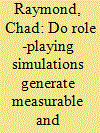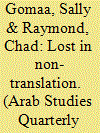| Srl | Item |
| 1 |
ID:
095641


|
|
|
|
|
| Publication |
2010.
|
| Summary/Abstract |
Role-playing simulations are frequently claimed to be effective pedagogical tools in the teaching of international relations (IR); however, there is a surprising lack of empirical evidence on their classroom utility. The assessment of simulations remains mostly anecdotal, and some recent research has found little to no statistically significant improvements in quantitative measures of academic performance among students who participated in them [for example, International Studies Perspectives (2006), vol. 7, pp. 395; International Studies Perspectives (2008), vol. 9, pp. 75-89]. Scant research has been conducted on how role-playing simulations might affect students' perceptions of the instructor's teaching. This paper investigates whether a simulation had statistically significant effect on students' exam scores in an IR course or on student teaching evaluation scores.
|
|
|
|
|
|
|
|
|
|
|
|
|
|
|
|
| 2 |
ID:
129499


|
|
|
|
|
| Publication |
2014.
|
| Summary/Abstract |
Undergraduate college student in the USA often encounter the Arab Middle East through novels translated into English. These novels are often presented by instructors and understood by students as stylized but accurate depictions of Arab societies as they currently exist. This article argues that the extremely limited number of translated Arabic novels that have made their way into American classrooms perpetuate stereotypes about Arab societies. These novels present student with themes that are often a historical and infused with violence, misogyny, and religious fanaticism. Although students may be highly interested in learning about Arab societies, the literary content they come across encourages affective rather than critical or complex responses.
|
|
|
|
|
|
|
|
|
|
|
|
|
|
|
|
| 3 |
ID:
155293


|
|
|
|
|
| Summary/Abstract |
We introduce a real-time problem-based simulation in which students are tasked with drafting policy to address the challenge of internally displaced persons in post-earthquake Haiti from a variety of stakeholder perspectives. Students who participated in the simulation completed a quantitative survey as a pre-/post-test on global empathy, political awareness, and civic engagement and provided qualitative data through post-simulation focus groups. The simulation was run in four courses across three campuses in a variety of instructional settings from 2013 to 2015. An analysis of the data reveals that scores on several survey items measuring global empathy and political/civic engagement increased significantly after the simulation, while qualitative student comments corroborated the results. This format of a real-time problem-based policy-making simulation is readily adaptable to other ongoing and future global crises using the framework provided in this paper.
|
|
|
|
|
|
|
|
|
|
|
|
|
|
|
|